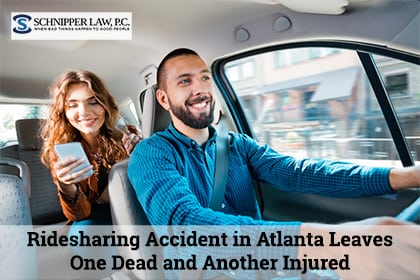Everyone knows that getting into a car comes with risks, but no one expects a simple ridesharing trip to end in a fatality. Unfortunately, however, a tragic ridesharing accident in Atlanta in April of 2018 had devastating consequences for two passengers.
Uber Accident Proves Fatal for One Atlanta Passenger
One April night, a young man called an Uber to take him from his job in Marietta to southeast Atlanta. On the way, the Uber driver stopped to pick up another passenger. Carpooling reduces costs for passengers, so it’s a popular option in many ridesharing apps. The male passenger, Devonte, moved to the front seat to let the new passenger, an elderly woman, have a comfortable seat in the back for the duration of the ride.

Medical Issues Behind the Crash
The driver’s apparent health issues were one of the key points of concern in this crash. Upon finding out the details of her son’s accident, the surviving passenger’s mother wondered why a ridesharing company would employ a driver with medical restrictions. Even if someone is cleared to drive a personal vehicle with health restrictions, it would be reasonable to expect a ridesharing company to have more stringent requirements in place for commercial drivers.
Since the crash, many questions remain unanswered. Uber, the ridesharing company in question, issued a statement offering their thoughts and prayers to everyone involved. This response left many wondering if Uber has any restrictions in place that prevent the employment of those with health issues.
Your Rights As a Ridesharing Passenger
Due to an increasing number of reports of accidents and assaults, many states have implemented additional legislation regulating ridesharing companies. In Georgia, House Bill 225 requires ridesharing companies to hold their drivers to standards similar to those found in the limousine and taxi industry. The bill requires that drivers have liability insurance, be at least 18 years of age, and undergo a driving history report.
Unfortunately, there are still risks in ridesharing arrangements that aren’t present with other forms of transportation. Taxis and cabs in Georgia must undergo stringent inspections to ensure that every part of each vehicle is safe for passenger transportation. On the flip side, many ridesharing companies do not have inspection requirements for drivers’ vehicles.
If you are injured in a ridesharing accident, you have rights regarding your medical bills and other expenses. Since Georgia ridesharing drivers are required to carry liability insurance, you should be able to recoup the costs you incur. Collecting is an entirely separate issue, however, since if you’re like many passengers, you are unaware of your rights. Plus, you may get the runaround from the driver’s insurance company or receive an unfair offer that does not fully cover your medical expenses or lost income.
As is the case in any vehicle accident, hiring a lawyer can improve your chances of collecting what you truly deserve. A personal injury lawyer in Atlanta can assess your damages, negotiate with insurance companies on your behalf, and help you decide what your next move should be.
Let Us Represent You in Your Ridesharing Case
If you’ve been involved in a ridesharing accident, it’s important to find an attorney who knows the intricacies of ridesharing laws and has your best interests in mind. Get a free case evaluation by contacting Schnipper Law, P.C. today at (404) 465-2878.
For More Information:
Top 3 Factors in a Personal Injury Case
3 Important Things to Know about Auto Accident Laws in Georgia
